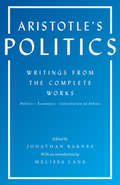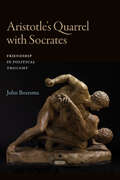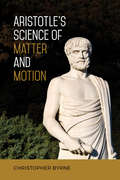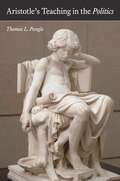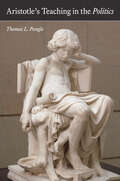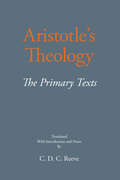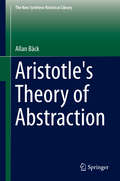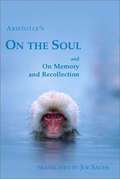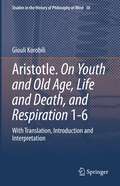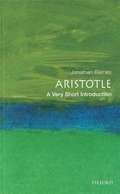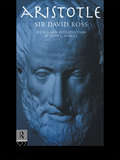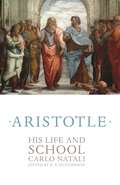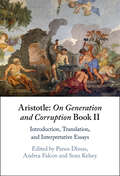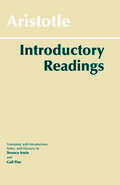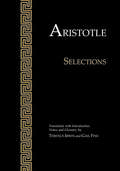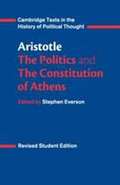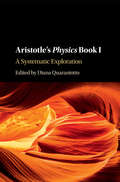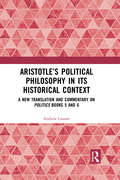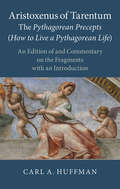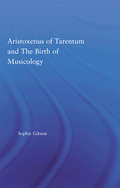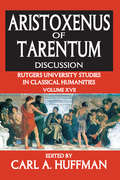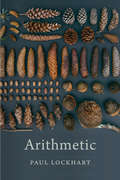- Table View
- List View
Aristotle's Politics: Politics, Economics, Constitution of Athens
by Aristotle Jonathan Barnes Melissa LaneAristotle was the first philosopher in the Western tradition to address politics systematically and empirically, and he remains a central figure in political theory. This essential volume presents Aristotle’s complete political writings—including his Politics, Economics, and Constitution of Athens—in their most authoritative translations, taken from the complete works that is universally recognized as the standard English edition. Edited by Jonathan Barnes, one of the world’s leading scholars of ancient philosophy, and with an illuminating introduction by Melissa Lane, an authority on ancient political philosophy, this compact but comprehensive volume will be invaluable for all students of politics, philosophy, classics, or Western thought.
Aristotle's Quarrel with Socrates: Friendship in Political Thought (SUNY series in Ancient Greek Philosophy)
by John BoersmaAristotle's Quarrel with Socrates is an account of the role friendship plays in ancient political thought. Examining Platonic dialogues and Aristotle's ethical and political treatises, John Boersma makes the case that the different stances Aristotle and Socrates take toward politics can be traced to their divergent accounts of friendship. Aristotle's Quarrel with Socrates brings to the fore the tension that exists between the philosophic life as exemplified by Socrates and the life devoted to politics. It goes on to argue that Aristotle's account of a friendship of the good, based on human excellence, can reduce, not to say eliminate, this tension, enabling the development of a political community that is organized for action in history.
Aristotle's Science of Matter and Motion
by Christopher ByrneAlthough Aristotle’s contribution to biology has long been recognized, there are many philosophers and historians of science who still hold that he was the great delayer of natural science, calling him the man who held up the Scientific Revolution by two thousand years. They argue that Aristotle never considered the nature of matter as such or the changes that perceptible objects undergo simply as physical objects; he only thought about the many different, specific natures found in perceptible objects. Aristotle’s Science of Matter and Motion’s focus is on refuting this misconception, arguing that Aristotle actually offered a systematic account of matter, motion, and the basic causal powers found in all physical objects. Author, Christopher Byrne sheds lights on Aristotle’s account of matter, revealing how Aristotle maintained that all perceptible objects are ultimately made from physical matter of one kind or another, accounting for their basic common features. For Aristotle, then, matter matters a great deal.
Aristotle's Teaching in the Politics
by Thomas L. PangleWith Aristotle's Teaching in the "Politics," Thomas L. Pangle offers a masterly new interpretation of this classic philosophical work. It is widely believed that the Politics originated as a written record of a series of lectures given by Aristotle, and scholars have relied on that fact to explain seeming inconsistencies and instances of discontinuity throughout the text. Breaking from this tradition, Pangle makes the work's origin his starting point, reconceiving the Politics as the pedagogical tool of a master teacher. With the Politics, Pangle argues, Aristotle seeks to lead his students down a deliberately difficult path of critical thinking about civic republican life. He adopts a Socratic approach, encouraging his students--and readers--to become active participants in a dialogue. Seen from this perspective, features of the work that have perplexed previous commentators become perfectly comprehensible as artful devices of a didactic approach. Ultimately, Pangle's close and careful analysis shows that to understand the Politics, one must first appreciate how Aristotle's rhetorical strategy is inextricably entwined with the subject of his work.
Aristotle's Teaching in the Politics
by Thomas L. PangleWith Aristotle’s Teaching in the “Politics,” Thomas L. Pangle offers a masterly new interpretation of this classic philosophical work. It is widely believed that the Politics originated as a written record of a series of lectures given by Aristotle, and scholars have relied on that fact to explain seeming inconsistencies and instances of discontinuity throughout the text. Breaking from this tradition, Pangle makes the work’s origin his starting point, reconceiving the Politics as the pedagogical tool of a master teacher.With the Politics, Pangle argues, Aristotle seeks to lead his students down a deliberately difficult path of critical thinking about civic republican life. He adopts a Socratic approach, encouraging his students—and readers—to become active participants in a dialogue. Seen from this perspective, features of the work that have perplexed previous commentators become perfectly comprehensible as artful devices of a didactic approach. Ultimately, Pangle’s close and careful analysis shows that to understand the Politics, one must first appreciate how Aristotle’s rhetorical strategy is inextricably entwined with the subject of his work.
Aristotle's Theology: The Primary Texts (The New Hackett Aristotle)
by Aristotle"Even those already familiar with Aristotle may be surprised to learn that discussions of theological topics can be found in so many of his works. Reeve's idea of packaging these texts sequentially along with commentary and notes is brilliant. This book will be essential reading for anyone interested in Aristotle's theology."—S. Marc Cohen,Professor of Philosophy, Emeritus, University of Washington
Aristotle's Theory of Abstraction (The New Synthese Historical Library #73)
by Allan BäckThis book investigates Aristotle's views on abstraction and explores how he uses it. In this work, the author follows Aristotle in focusing on the scientific detail first and then approaches the metaphysical claims, and so creates a reconstructed theory that explains many puzzles of Aristotle's thought. Understanding the details of his theory of relations and abstraction further illuminates his theory of universals. Some of the features of Aristotle's theory of abstraction developed in this book include: abstraction is a relation; perception and knowledge are types of abstraction; the objects generated by abstractions are relata which can serve as subjects in their own right, whereupon they can appear as items in other categories. The author goes on to look at how Aristotle distinguishes the concrete from the abstract paronym, how induction is a type of abstraction which typically moves from the perceived individuals to universals and how Aristotle's metaphysical vocabulary is "relational. ' Beyond those features, this work also looks at how of universals, accidents, forms, causes and potentialities have being only as abstract aspects of individual substances. An individual substance is identical to its essence; the essence has universal features but is the singularity making the individual substance what it is. These theories are expounded within this book. One main attraction in working out the details of Aristotle's views on abstraction lies in understanding his metaphysics of universals as abstract objects. This work reclaims past ground as the main philosophical tradition of abstraction has been ignored in recent times. It gives a modern version of the medieval doctrine of the threefold distinction of essence, made famous by the Islamic philosopher, Avicenna.
Aristotle's: On the Soul and On Memory and Recollection
by Aristotle Joe SachsIn this timeless and profound inquiry, Aristotle presents a view of the psyche that avoids the simplifications both of the materialists and those who believe in the soul as something quite distinct from body. On the Soul also includes Aristotle's idiosyncratic and influential account of light and colors. On Memory and Recollection continues the investigation of some of the topics introduced in On the Soul. Sachs's fresh and jargon-free approach to the translation of Aristotle, his lively and insightful introduction, and his notes and glossaries, all bring out the continuing relevance of Aristotle's thought to biological and philosophical questions.
Aristotle, Plato and Pythagoreanism in the First Century BC
by Malcolm SchofieldThis book presents an up-to-date overview of the main new directions taken by ancient philosophy in the first century BC, a period in which the dominance exercised in the Hellenistic age by Stoicism, Epicureanism and Academic Scepticism gave way to a more diverse and experimental philosophical scene. Its development has been much less well understood, but here a strong international team of leading scholars of the subject reconstruct key features of the changed environment. They examine afresh the evidence for some of the central Greek thinkers of the period, as well as illuminating Cicero's engagement with Plato both as translator and in his own philosophising. The intensity of renewed study of Aristotle's Categories and Plato's Timaeus is an especially striking outcome of their discussions. The volume will be indispensable for scholars and students interested in the history of Platonism and Aristotelianism.
Aristotle. On Youth and Old Age, Life and Death, and Respiration 1-6: With Translation, Introduction and Interpretation (Studies in the History of Philosophy of Mind #30)
by Giouli KorobiliThis book is devoted to the last part of Aristotle’s collection of short treatises known today as the Parva Naturalia, i.e. the treatise On Youth and Old Age, on Life and Death, on Respiration. In the three main sections of the book, the author offers a translation, a commentary and a thorough analysis of this work. The author argues in favour of the unity of the work and contextualises its ideas within Aristotle’s corpus and the medical tradition of his time. After an Introduction to the nature of the work and its significance for the history of natural philosophy and science, a new English translation follows, along with a detailed commentary of Chapters 1-6, which combines philosophical discussion with philological observations. The book includes four interpretive essays, which tackle problems related to the whole treatise on a more philosophical basis, including questions about the structure and unity of the work, the organisation of the material, Aristotle’s methodological principles, his aims and target audience as well as the relevance of his selected themes to the thematic agenda of some Hippocratic writings. This book is of interest to students and researchers in Aristotle’s psychophysiology, and his views about the embodied mind, as well as to anyone concerned with the history of natural philosophy and science more generally.
Aristotle: A Very Short Introduction
by Jonathan BarnesAristotle died in the autumn of 322 BC He was sixty-two and at the height of his powers: a scholar whose scientific explorations were as wide-ranging as his philosophical speculations were profound; a teacher who enchanted and inspired the brightest youth of Greece; a public figure who lived a turbulent life in a turbulent world. He bestrode antiquity like an intellectual colossus. No man before him had contributed so much to learning. No man after him might aspire to rival his achievements.
Aristotle: De Anima
by David RossSir David Ross was one of the most distinguished and influential Aristotelians of this century; his study has long been established as an authoritative survey of the life, work and philosophy of Aristotle.This clear and lucid account contains useful summaries of theories and arguments, with brief, suggestive critical comments. Aristotle's work encompassed all the branches of science and learning which were central to the intellectual life of the ancient world: logic, the philosophy of nature, biology, psychology, metaphysics, ethics, politics, rhetoric and poetics. Aristotle's borrowings from his predecessors, and his own fundamental influence on later philosophy, are also examined. Important Greek terms in Aristotle's work are explained and discussed.Aristotle is now re-issued with a new introduction by John L. Ackrill, which reviews developments in Aristotelian studies since Sir David Ross originally wrote his classic study. The bibliography has been supplemented by references to recent works. Both students of philosophy and general rea ders will find the volume an indispensable guide to Aristotle's thought.
Aristotle: His Life and School
by Carlo NataliThe definitive account of Aristotle's life and schoolThis definitive biography shows that Aristotle's philosophy is best understood on the basis of a firm knowledge of his life and of the school he founded. First published in Italian, and now translated, updated, and expanded for English readers, this concise chronological narrative is the most authoritative account of Aristotle's life and his Lyceum available in any language. Gathering, distilling, and analyzing all the evidence and previous scholarship, Carlo Natali, one of the world's leading Aristotle scholars, provides a masterful synthesis that is accessible to students yet filled with evidence and original interpretations that specialists will find informative and provocative.Cutting through the controversy and confusion that have surrounded Aristotle's biography, Natali tells the story of Aristotle's eventful life and sheds new light on his role in the foundation of the Lyceum. Natali offers the most detailed and persuasive argument yet for the view that the school, an important institution of higher learning and scientific research, was designed to foster a new intellectual way of life among Aristotle's followers, helping them fulfill an aristocratic ideal of the best way to use the leisure they enjoyed. Drawing a wealth of connections between Aristotle's life and thinking, Natali demonstrates how the two are mutually illuminating.For this edition, ancient texts have been freshly translated on the basis of the most recent critical editions; indexes have been added, including a comprehensive index of sources and an index to previous scholarship; and scholarship that has appeared since the book's original publication has been incorporated.
Aristotle: Introduction, Translation, and Interpretative Essays
by Andrea Falcon Sean Kelsey Panos DimasGeneration and Corruption II is concerned with Aristotle's theory of the elements, their reciprocal transformations and the cause of their perpetual generation and corruption. These matters are essential to Aristotle's picture of the world, making themselves felt throughout his natural science, including those portions of it that concern living things. What is more, the very inquiry Aristotle pursues in this text, with its focus on definition, generality, and causation, throws important light on his philosophy of science more generally. This volume contains eleven new essays, one for each of the chapters of this Aristotelian text, plus a general introduction and an English translation of the Greek text. It gives substantial attention to an important and neglected text, and highlights its relevance to other topics of current and enduring interest.
Aristotle: Introductory Readings
by Aristotle Terence Irwin Gail FineDrawn from the translations and editorial aids of Irwin and Fine's Aristotle, Selections (Hackett Publishing Co., 1995), this anthology will be most useful to instructors who must try to do justice to Aristotle in a semester-long ancient-philosophy survey, but it will also be appropriate for a variety of introductory-level courses. Introductory Readings provides accurate, readable, and integrated translations that allow the reader to follow Aristotle's use of crucial technical terms and to grasp the details of his argument. Included are adaptations of the glossary and notes that helped make its parent volume a singularly useful aid to the study of Aristotle.
Aristotle: Selections
by Aristotle Terence Irwin Gail FineSelections seeks to provide an accurate and readable translation that will allow the reader to follow Aristotle's use of crucial technical terms and to grasp the details of his argument. Unlike anthologies that combine translations by many hands, this volume includes a fully integrated set of translations by a two-person team. The glossary--the most detailed in any edition--explains Aristotle's vocabulary and indicates the correspondences between Greek and English words. Brief notes supply alternative translations and elucidate difficult passages.
Aristotle: The Desire to Understand
by Jonathan LearThis is a philosophical introduction to Aristotle, and Professor Lear starts where Aristotle himself starts. The first sentence of the Metaphysics states that all human beings by their nature desire to know. But what is it for us to be animated by this desire in this world? What is it for a creature to have a nature; what is our human nature; what must the world be like to be intelligible; and what must we be like to understand it systematically? Through a consideration of these questions Professor Lear introduces us to the essence of Aristotle's philosophy and guides us through the central Aristotelian texts - selected from the Physics, Metaphysics, Ethics, Politics and from the biological and logical works. The book is written in a direct, lucid style which engages the reader with the themes in an active, participatory manner.
Aristotle: The Politics and the Constitution of Athens
by AristotleThis new collection of Aristotle's political writings aims to provide the student with all the necessary materials for a full understanding of his work as a political scientist. Translated by Stephen Everson,
Aristotle’s Ethics and Medieval Philosophy
by Anthony J. CelanoAristotle's Nicomachean Ethics had a profound influence on generations of later philosophers, not only in the ancient era but also in the medieval period and beyond. In this book, Anthony Celano explores how medieval authors recast Aristotle's Ethics according to their own moral ideals. He argues that the moral standard for the Ethics is a human one, which is based upon the ethical tradition and the best practices of a given society. In the Middle Ages, this human standard was replaced by one that is universally applicable, since its foundation is eternal immutable divine law. Celano resolves the conflicting accounts of happiness in Aristotle's Nicomachean Ethics, demonstrates the importance of the virtue of phronesis (practical wisdom), and shows how the medieval view of moral reasoning alters Aristotle's concept of moral wisdom.
Aristotle’s Physics Book I: A Systematic Exploration
by Diana QuarantottoThis book provides a comprehensive and in-depth study of Physics I, the first book of Aristotle's foundational treatise on natural philosophy. While the text has inspired a rich scholarly literature, this is the first volume devoted solely to it to have been published for many years, and it includes a new translation of the Greek text. Book I introduces Aristotle's approach to topics such as matter and form, and discusses the fundamental problems of the study of natural science, examining the theories of previous thinkers including Parmenides. Leading experts provide fresh interpretations of key passages and raise new problems. The volume will appeal to scholars and students of ancient philosophy as well as to specialists working in the fields of philosophy and the history of science.
Aristotle’s Political Philosophy in its Historical Context: A New Translation and Commentary on Politics Books 5 and 6
by Andrew LintottThis book offers new translations of Aristotle’s Politics 5 and 6, accompanied by an introduction and commentary, targeted at historians and those who like to read political science in the context in which it was produced. Philosophical analysis remains essential and there is no intention to detract from the books as political theory, but the focus of this volume is the text as a crucial element in the discourse of fourth-century Greece, and the conflict throughout the Greek world between democracy, oligarchy, and the rise of the Macedonian monarchy.
Aristoxenus of Tarentum (How to Live a Pythagorean Life): An Edition of and Commentary on the Fragments with an Introduction
by Carl A. HuffmanThe Pythagorean Precepts by Aristotle's pupil, Aristoxenus of Tarentum, present the principles of the Pythagorean way of life that Plato praised in the Republic. They are our best guide to what it meant to be a Pythagorean in the time of Plato and Aristotle. The Precepts have been neglected in modern scholarship and this is the first full edition and translation of and commentary on all the surviving fragments. The introduction provides an accessible overview of the ethical system of the Precepts and their place not only in the Pythagorean tradition but also in the history of Greek ethics as a whole. The Pythagoreans thought that human beings were by nature insolent and excessive and that they could only be saved from themselves if they followed a strictly structured way of life. The Precepts govern every aspect of life, such as procreation, abortion, child rearing, friendship, religion, desire and even diet.
Aristoxenus of Tarentum and the Birth of Musicology (Studies in Classics #Vol. 9)
by Sophie GibsonAristoxenus made an enormous contribution to the development of music theory in antiquity. Despite his Pythagorean upbringing, he rejected Pythagorean methods of harmonics which focused on the mathematical significance of musical structures and instead applied a scientific methodology appropriated from Aristotle. This volume studies the theories of Aristoxenus.
Aristoxenus of Tarentum: Texts and Discussion
by Carl HuffmanAristoxenus of Tarentum was reported to have been bitterly disappointed when Theophrastus was chosen instead of him to succeed Aristotle as the head of the Peripatetic School. He had a truly phenomenal output of some 453 volumes, most of which survive only in fragments. He was the most famous music theorist in antiquity and came to be referred to simply as "the musician." In addition, he was a founder of Greek biography and wrote the life histories of Pythagoras, Archytas, Socrates, and Plato among others. This volume includes eleven selections, which are almost evenly divided between his work in music theory and biography. There is a chapter on his general biographical method as well as chapters on his specific treatments of the Pythagoreans, Socrates, and Plato. There are chapters evaluating the extent to which Aristoxenus was a historian of music, his account of music therapy, his views on musical "character," the use of instruments and empiricism in his harmonic theory, and his relation to the "Neoclassical" Greek composers of the fourth century. This volume includes: "Did Aristoxenus Write Musical History?, " Andrew Barker; "Instruments and Empiricism in Aristoxenus' Elementa harmonica," David Creese; "Aristoxenus and Musical Ethos," Eleonora Rocconi; "Aristoxenus and Music Therapy: Fr. 26 Wehrli Within the Tradition on Music and Catharsis," Antonella Provenza; "Aristoxenus and the "Neoclassicists," Timothy Power; "Apollonius on Theophrastus on Aristoxenus," William W. Fortenbaugh; "Aristoxenus' Biographical Method," Stefan Schorn; "Aristoxenus and the Pythagoreans," Leonid Zhmud; "Aristoxenus' Life of Socrates," Carl A. Huffman; "Aristoxenus' Life of Plato," John Dillon; and "Aristoxenus and the Early Academy," Andrew Barker. Spanning close to three full decades, Transaction's Rutgers University Studies in Classical Humanities Series continues to pioneer in the field of classical studies.
Arithmetic
by Paul LockhartPaul Lockhart reveals arithmetic not as the rote manipulation of numbers but as a set of ideas that exhibit the surprising behaviors usually reserved for higher branches of mathematics. In this entertaining survey, he explores the nature of counting and different number systems—Western and non-Western—and weighs the pluses and minuses of each.
